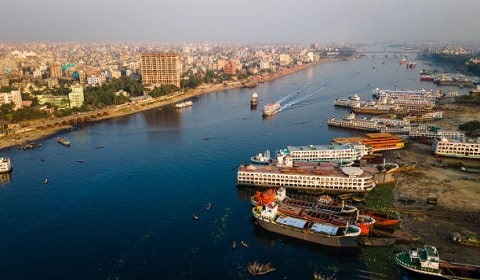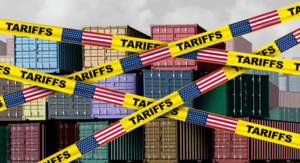
The Impact of Russia-Ukraine War on Bangladesh Economy
Impact of Russia-Ukraine War on Bangladesh economy are multifaceted and significant, spanning various sectors and aspects of the nation’s economic situation.
As a globally interconnected economy, Bangladesh is not immune to the ripple effects of geopolitical conflicts. The conflict’s implications on commodity prices, particularly energy and food, as well as disruptions in trade routes and remittance inflows, pose challenges to Bangladesh’s economic stability.
Moreover, heightened uncertainty and volatility in international markets could dampen investor confidence and hinder economic growth prospects. Thus, a nuanced understanding of the war’s ramifications is crucial for policymakers and stakeholders to navigate potential challenges effectively.
Impact of Russia-Ukraine War on Bangladesh Economy
The recent escalation of the Russia-Ukraine conflict has sent shockwaves across the globe, with reverberations felt even in countries geographically distant from the epicenter of the conflict.
Bangladesh, situated in South Asia, is not immune to the economic repercussions of this geopolitical turmoil. As the conflict unfolds, Bangladesh’s economy faces various challenges and potential disruptions, impacting different sectors and facets of its economic aspect.
Impact of Russia-Ukraine war on Bangladesh economy include heightened energy prices, disrupted supply chains, and potential shifts in global trade dynamics, all of which could exert pressure on Bangladesh’s export-oriented industries and overall economic stability.
Here, we delve into the impact of Russia-Ukraine war on Bangladesh economy, examining the key points and to understand the magnitude of these effects.
Table of Contents
1. Energy Prices and Import Dependency
Bangladesh imported around 30 million metric tons of crude oil (fiscal year 2022-23), with Russia contributing 5-7% and Ukraine providing a smaller yet notable share. Data from the Bangladesh Petroleum Corporation (BPC) and the Bangladesh Energy Regulatory Commission (BERC) reveal this import distribution.
The Bangladesh Bank warns that a 10% surge in oil prices could lead to a 0.3-0.4% increase in the country’s inflation rate. This underscores the nation’s vulnerability to global oil market fluctuations and highlights the importance of energy diversification and strategic economic planning to mitigate potential impacts on inflation and overall economic stability.
The ongoing Russia-Ukraine war further intensifies concerns about energy security and economic stability for Bangladesh, as disruptions in the global oil market could exacerbate inflationary pressures and pose challenges to the country’s economic growth trajectory.
2. Remittances from Ukrainian and Russian Workers
Bangladesh experienced a substantial influx of $22.75 billion in remittances (fiscal year 2022-23), equivalent to roughly 6.7% of its GDP, as per Bangladesh Bank data. Notably, the Bureau of Manpower, Employment, and Training (BMET) highlighted that approximately 50,000 Bangladeshi workers found employment in Ukraine and Russia during this period.
Remittances from these regions played a vital role in bolstering household incomes, underscoring the significance of the overseas workforce to Bangladesh’s economy. This financial support underscores the resilience and impact of Bangladeshi migrants, reaffirming their contribution to the nation’s economic stability and the welfare of families back home.
Moreover, as the Russia-Ukraine war unfolds, its impacts on Bangladesh economy, especially concerning the potential disruptions to the overseas employment sector and remittance inflows, need careful consideration.
3. Impact on Ready-Made Garment (RMG) Sector
In 2022-23, Bangladesh’s RMG exports totaled $28.14 billion, as per the Export Promotion Bureau (EPB). Notably, Russia and Ukraine constituted around 5-7% of these exports. However, a discernible decrease occurred during the initial quarter of escalating conflict, as indicated by EPB data.
Impact of Russia-Ukraine war on Bangladesh economy included a notable decline in RMG exports to these regions during this period. Despite this setback, Bangladesh’s RMG sector remained robust, demonstrating resilience amid geopolitical challenges.
The figures underscore Bangladesh’s significant presence in the global garment market and its ability to adapt to shifting trade dynamics.
This reflects both the industry’s dependence on stable international relations and its capacity to navigate disruptions, reaffirming Bangladesh’s position as a key player in the global textile trade.
4. Fertilizer and Agriculture Sector
Bangladesh, in last fiscal year, procured roughly 3.5 million metric tons of urea fertilizer, with Ukraine emerging as a primary provider, as per the Bangladesh Agricultural Development Corporation (BADC).
The agricultural domain significantly bolstered Bangladesh’s GDP, constituting approximately 13.8% of its fiscal output during the same period. Remarkably, this sector also absorbed nearly 41% of the nation’s labor force, according to statistics compiled by the Ministry of Agriculture.
Such robust figures underscore the vital role agriculture plays in the country’s economy, highlighting its dependence on fertilizer imports to sustain agricultural productivity and support the livelihoods of a substantial portion of the population.
Considering the impact of the Russia-Ukraine war on global fertilizer markets, Bangladesh’s economy may face challenges in securing an adequate supply of fertilizers, potentially affecting agricultural output and economic stability.
5. Foreign Direct Investment (FDI) and Investor Sentiment
Bangladesh saw a notable inflow of $2.56 billion in Foreign Direct Investment (FDI), as per Bangladesh Bank’s report in last year. However, amidst the initial quarter of the Russia-Ukraine conflict escalation, foreign investors pulled out around $100 million from Bangladesh’s stock market, based on Dhaka Stock Exchange data.
This fluctuation underscores the sensitivity of global economic events on investment flows in emerging markets like Bangladesh. This complexity, the impacts of the Russia-Ukraine war on Bangladesh’s economy are multifaceted and evolving.
Despite the withdrawal, Bangladesh’s FDI inflows reflect ongoing investor confidence in the country’s economic prospects. Monitoring such developments remains crucial for policymakers to mitigate potential impacts and sustain a conducive investment environment for sustainable growth.
6. Humanitarian Implications and Aid Dependency
The impact of Russia-Ukraine war on Bangladesh economy, including potential fluctuations in global commodity prices and trade disruptions, could further exacerbate the financial challenges faced in supporting Rohingya refugees.
Bangladesh currently shelters approximately 1.1 million Rohingya refugees in Cox’s Bazar camps, as reported by the United Nations High Commissioner for Refugees (UNHCR). These refugees fled persecution in Myanmar, seeking safety and refuge in Bangladesh.
However, the humanitarian efforts to support them face significant financial challenges, with a funding shortfall of around $350 million identified in 2023, according to UNHCR assessments. This deficit poses a critical obstacle to providing essential services and aid to the Rohingya population, including healthcare, education, and basic necessities.
The international community’s support is crucial in addressing this funding gap and ensuring the well-being and dignity of Rohingya refugees in Bangladesh.
7. Diplomatic and Trade Policy Responses
In 2022-23, Bangladesh witnessed a notable 13.24% surge in exports to non-traditional markets, according to the Export Promotion Bureau (EPB). This rise underscores the nation’s diversification efforts in trade.
Concurrently, Bangladesh is actively pursuing renewable energy initiatives, striving to elevate the proportion of renewable energy within its energy matrix to 10% by 2021. This commitment aligns with the objectives delineated in the Bangladesh Energy Regulatory Commission’s (BERC) Renewable Energy Policy.
By investing in renewable energy projects, Bangladesh aims not only to enhance its energy sustainability but also to contribute to global environmental goals, showcasing its dedication to progressive economic and ecological development.
The impact of Russia-Ukraine war on Bangladesh economy, however, loom uncertain, with potential ramifications on global energy markets and trade dynamics.
Bottom Line
The Russia-Ukraine conflict poses multifaceted challenges and uncertainties for Bangladesh’s economy, ranging from energy price volatility to disruptions in key sectors like RMG and agriculture.
As the situation unfolds, policymakers need to adopt proactive measures to cushion the economy from external shocks, enhance resilience, and safeguard the welfare of the population.
Collaborative efforts at the national, regional, and international levels are imperative to navigate through these turbulent times and foster sustainable economic growth and development in Bangladesh.
The impact of Russia-Ukraine war on Bangladesh economy, such as potential disruptions in trade routes and commodity prices, must be carefully monitored and addressed to mitigate any adverse effects on the country’s economic stability.





